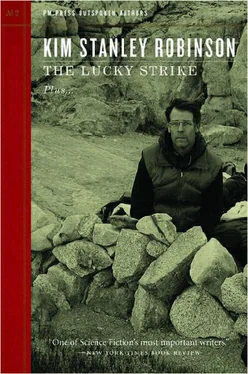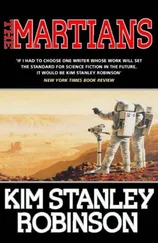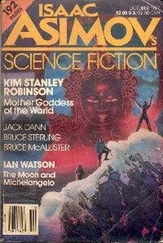The thought passed and remembering it January squinted with disgust. But another part of him agreed that it was a possibility. It could be done. It would solve his problem. His fingers explored his holster snap.
“Want some coffee?” Matthews asked.
“Sure,” January said, and took his hand from the gun to reach for the cup. He sipped: hot. He watched Matthews and Benton tune the loran equipment. As the beeps came in Matthews took a straightedge and drew lines from Okinawa and Iwo Jima on his map table. He tapped a finger on the intersection. “They’ve taken the art out of navigation,” he said to January. “They might as well stop making the navigator’s dome,” thumbing up at the little Plexiglas bubble over them.
“Good old American know-how,” January said.
Matthews nodded. With two fingers he measured the distance between their position and Iwo Jima. Benton measured with a ruler.
“Rendezvous at five thirty-five, eh?” Matthews said. They were to rendezvous with the two trailing planes over Iwo.
Benton disagreed: “I’d say five-fifty.”
“What? Check again, guy, we’re not in no tugboat here.”
“The wind—”
“Yah, the wind. Frank, you want to add a bet to the pool?”
“Five thirty-six,” January said promptly.
They laughed. “See, he’s got more confidence in me,” Matthews said with a dopey grin.
January recalled his plan to shoot the crew and tip the plane into the sea, and he pursed his lips, repelled. Not for anything would he be able to shoot these men, who, if not friends, were at least companions. They passed for friends. They meant no harm.
Shepard and Stone climbed into the cabin. Matthews offered them coffee. “The gimmick’s ready to kick their ass, eh?” Shepard nodded and drank.
January moved forward, past Haddock’s console. Another plan that wouldn’t work. What to do? All the flight engineer’s dials and gauges showed conditions were normal. Maybe he could sabotage something? Cut a line somewhere?
Fitch looked back at him and said, “When are we due over Iwo?”
“Five-forty, Matthews says.”
“He better be right.”
A thug. In peacetime Fitch would be hanging around a pool table giving the cops trouble. He was perfect for war. Tibbets had chosen his men well—most of them, anyway. Moving back past Haddock, January stopped to stare at the group of men in the navigation cabin. They joked, drank coffee. They were all a bit like Fitch: young toughs, capable and thoughtless. They were having a good time, an adventure. That was January’s dominant impression of his companions in the 509th; despite all the bitching and the occasional moments of overmastering fear, they were having a good time. His mind spun forward and he saw what these young men would grow up to be like as clearly as if they stood before him in businessmen’s suits, prosperous and balding. They would be tough and capable and thoughtless, and as the years passed and the great war receded in time they would look back on it with ever-increasing nostalgia, for they would be the survivors and not the dead. Every year of this war would feel like ten in their memories, so that the war would always remain the central experience of their lives—a time when history lay palpable in their hands, when each of their daily acts affected it, when moral issues were simple, and others told them what to do—so that as more years passed and the survivors aged, bodies falling apart, lives in one rut or another, they would unconsciously push harder and harder to thrust the world into war again, thinking somewhere inside themselves that if they could only return to world war then they would magically be again as they were in the last one—young, and free, and happy. And by that time they would hold the positions of power, they would be capable of doing it.
So there would be more wars, January saw. He heard it in Matthews’ laughter, saw it in their excited eyes. “There’s Iwo and it’s five thirty-one. Pay up! I win!” And in future wars they’d have more bombs like the gimmick, hundreds of them no doubt. He saw more planes, more young crews like this one, flying to Moscow no doubt or to wherever, fireballs in every capital, why not? And to what end? To what end? So that the old men could hope to become magically young again. Nothing more sane than that.
They were over Iwo Jima. Three more hours to Japan. Voices from The Great Artiste and Number 91 crackled on radio. Rendezvous accomplished, the three planes flew northwest, toward Shikoku, the first Japanese island in their path. January went aft to use the toilet. “You okay, Frank?” Matthews asked. “Sure. Terrible coffee, though.” “Ain’t it always.” January tugged at his baseball cap and hurried away. Kochenski and the other gunners were playing poker. When he was done he returned forward. Matthews sat on the stool before his maps, readying his equipment for the constant monitoring of drift that would now be required. Haddock and Benton were also busy at their stations. January maneuvered between the pilots down into the nose. “Good shooting,” Matthews called after him.
Forward it seemed quieter. January got settled, put his headphones on and leaned forward to look out the ribbed Plexiglas.
Dawn had turned the whole vault of the sky pink. Slowly the radiant shade shifted through lavender to blue, pulse by pulse a different color. The ocean below was a glittering blue plane, marbled by a pattern of puffy pink cloud. The sky above was a vast dome, darker above than on the horizon. January had always thought that dawn was the time when you could see most clearly how big the earth was, and how high above it they flew. It seemed they flew at the very upper edge of the atmosphere, and January saw how thin it was, how it was just a skin of air really, so that even if you flew up to its top the earth still extended away infinitely in every direction. The coffee had warmed January, he was sweating. Sunlight blinked off the Plexiglas. His watch said six. Plane and hemisphere of blue were split down the middle by the bombsight. His earphones crackled and he listened in to the reports from the lead planes flying over the target cities. Kokura, Nagasaki, Hiroshima, all of them had six-tenths cloud cover. Maybe they would have to cancel the whole mission because of weather. “We’ll look at Hiroshima first,” Fitch said. January peered down at the fields of miniature clouds with renewed interest. His parachute slipped under him. Readjusting it he imagined putting it on, sneaking back to the central escape hatch under the navigator’s cabin, opening the hatch… he could be out of the plane and gone before anyone noticed. Leave it up to them. They could bomb or not but it wouldn’t be January’s doing. He could float down onto the world like a puff of dandelion, feel cool air rush around him, watch the silk canopy dome hang over him like a miniature sky, a private world.
An eyeless black face. January shuddered; it was as though the nightmare could return any time. If he jumped nothing would change, the bomb would still fall—would he feel any better, floating on his Inland Sea? Sure, one part of him shouted; maybe, another conceded; the rest of him saw that face….
Earphones crackled. Shepard said, “Lieutenant Stone has now armed the bomb, and I can tell you all what we are carrying. Aboard with us is the world’s first atomic bomb.”
Not exactly, January thought. Whistles squeaked in his earphones. The first one went off in New Mexico. Splitting atoms: January had heard the term before. Tremendous energy in every atom, Einstein had said. Break one, and—he had seen the result on film. Shepard was talking about radiation, which brought back more to January. Energy released in the form of X rays. Killed by X rays! It would be against the Geneva Convention if they had thought of it.
Читать дальше












